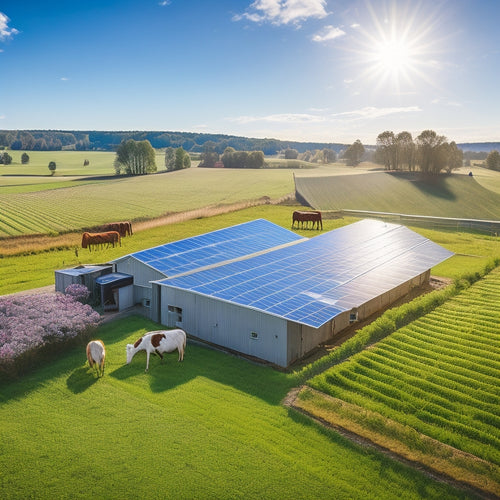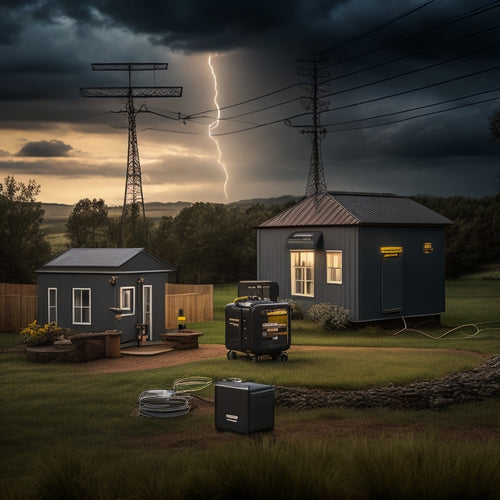
Solar Panels for Cabin
Share
You can install solar panels on your cabin to achieve energy independence and eliminate energy bills, with a well-designed system paying for itself in as little as 5-7 years through guaranteed monthly savings and potential increases in cabin value. By utilizing renewable energy, you'll reduce your carbon footprint and promote self-sufficiency. Off-grid systems with battery storage and solar inverters guarantee uninterrupted power, even during low sunlight periods. To optimize energy production, look for high-efficiency panels with Maximum Power Point Tracking and low light performance specifications. Now, let's examine the key factors to evaluate when selecting and designing your cabin's solar panel system.
The Essentials
- Off-grid solar systems provide reliable, eco-friendly energy independence for cabin owners in remote areas, minimizing reliance on the grid.
- Solar panels can eliminate energy bills by generating on-site electricity, with surplus energy production offsetting energy consumption and building grid credits.
- High-efficiency solar panels with advanced techniques enhance energy harvesting, even in low light conditions, ensuring power reliability for cabin owners.
- Durable and weather-resistant solar panels with specialized coatings and robust materials withstand harsh environmental conditions, providing long-term reliability.
- Investing in solar panels for cabins can increase property value, recoup costs in 5-7 years, and provide guaranteed monthly savings on energy bills.
Renewable Energy for Remote
You're likely considering solar panels for your cabin to achieve energy independence, and you're not alone.
With off-grid power options, you can generate your own electricity and reduce your reliance on traditional utility companies.
Many cabin owners opt for Off-Grid Solar Energy System solutions to bring power and comfort to their remote getaways.
Energy Independence Now
Achieving energy independence is a top priority for many cabin owners, especially those situated in remote areas where traditional power grids are unreliable or non-existent. You want to break free from reliance on external power sources and live off the land, embracing a sustainable living cabin lifestyle.
Renewable resources, such as solar energy, offer a reliable and eco-friendly solution to your energy needs. By utilizing the power of the sun, you can reduce your carbon footprint and conserve energy, aligning with your values of self-sufficiency and connection with nature.
With an off-grid solar system, you can minimize your reliance on the grid and enjoy uninterrupted power supply wherever you are. Embracing green technology, you're taking an essential step towards energy independence.
You'll enjoy the freedom to venture into remote living, knowing your energy needs are met without harming the environment. With solar panels, you'll have the power to pursue outdoor escapades, unencumbered by the constraints of traditional power grids.
Your cabin becomes a symbol of independence, a demonstration of your commitment to sustainable living and eco-friendly practices. By choosing solar energy, you're not only reducing your reliance on external power sources but also contributing to a cleaner, healthier planet.
Off-Grid Power Options
Off-grid power options open up a world of possibilities for cabin owners seeking energy independence. With the right setup, you can generate and store your own energy, freeing yourself from reliance on the grid.
A key component of off-grid power is battery storage, which allows you to store excess energy generated by your solar panels during the day for use at night or during periods of low sunlight. Traditional battery banks can be plagued by inconsistent charging, leading to frustrating power losses and limited uptime, but with Deep Cycle Batteries, you can guarantee a reliable and efficient energy storage solution.
To guarantee a smooth shift between generating and storing energy, you'll need a solar inverter. This device converts the DC power from your solar panels into AC power, which is compatible with your cabin's electrical system. When the sun isn't shining, the inverter can also draw power from your battery storage, providing a seamless supply of energy.
Zero Energy Bills Guaranteed
You can eliminate your energy bills with a solar panel system designed to meet your cabin's specific energy needs.
By generating electricity on-site, you'll offset your energy consumption and potentially even produce a surplus.
With a well-designed system, you can save money guaranteed and enjoy zero energy costs, especially when paired with an off-grid cabin solar power system that allows you to live independently off the grid.
This way, you can utilize renewable energy and achieve energy efficiency in your rural cabin.
Zero Energy Costs
With a solar panel system, every kilowatt-hour of electricity generated is one less you'll need to purchase from the grid, ultimately leading to zero energy costs. This is because you'll be producing your own clean energy, reducing your reliance on the utility company.
As you generate more power than you consume, you'll build up credits with the grid, which can be used to offset energy costs during periods of low sunlight.
You can further optimize your system with energy storage solutions, allowing you to store excess energy generated during the day for use at night or during power outages. This way, you'll have a reliable source of energy, even when the grid is down.
Additionally, you can take advantage of solar incentives, such as the federal tax credit, to offset the initial cost of your system. By investing in a solar panel system, you'll be taking a significant step towards energy independence, reducing your energy costs and your carbon footprint.
With zero energy costs, you'll have more freedom to focus on what matters most – enjoying your cabin and the great outdoors.
Save Money Guaranteed
Every month, a guaranteed savings awaits you when you opt for a solar panel system specifically designed to eliminate energy bills. This means you'll no longer be at the mercy of rising energy costs, and you can enjoy the freedom that comes with knowing exactly how much you'll save each month.
When you invest in a solar panel system, you're not just reducing your energy bills; you're also increasing the value of your cabin. This cost-effective solution can recoup its investment benefits in as little as five to seven years, depending on your energy usage and local incentives.
Plus, with a solar panel system, you can lock in a fixed energy rate for the next 25 years or more, protecting you from inflation and rate hikes.
Maximum Power Point Tracking
You'll want to guarantee your solar panel system is equipped with maximum power point tracking (MPPT) to enhance energy harvesting, especially when living in remote areas with limited access to rural solar power off-grid energy solutions.
This is vital for off-grid living, where energy efficiency is key. This technology allows your system to track the best voltage and current output of your solar panels, resulting in up to 30% more energy production.
Efficient Energy Harvesting
One vital aspect of efficient energy harvesting from solar panels is Maximum Power Point Tracking (MPPT).
You'll want to verify your solar panel system is tuned to capture the most energy possible. MPPT is a technique that tracks the maximum power point of your solar panels, adjusting the voltage and current to maximize energy production. This is essential, as solar panel types can vary in their power output.
When installing your solar panels, consider the cabin orientation and tilt to maximize energy harvesting. Proper maintenance practices, such as cleaning and inspecting your panels, will also help maintain ideal energy production.
When analyzing the cost of your system, consider the environmental impact and the potential savings on your energy bills. By sizing your system correctly and integrating energy storage, you can guarantee a reliable and efficient energy supply.
Additionally, consider grid connection and battery integration to further enhance your energy harvesting.
Optimal Voltage Regulation
Maximum power point tracking (MPPT) relies on ideal voltage regulation to guarantee your solar panel system operates at its peak performance. As you aim for energy independence, understanding the importance of ideal voltage regulation is vital.
You see, MPPT is a technique used to enhance power output by tracking the maximum power point of your solar panels. This is achieved through advanced regulation techniques that maintain voltage stability.
To maintain voltage stability, your solar panel system must be able to adapt to changing environmental conditions, such as temperature and irradiance. This is where advanced regulation techniques come into play.
You'll want to look for a system that employs a high-efficiency MPPT algorithm, which can accurately track the maximum power point and adjust the voltage accordingly. This guarantees that your system operates within the ideal voltage range, maximizing energy production and reducing energy losses.
Efficiency in Low Light
You'll encounter low light conditions at your cabin, especially during winter months or in heavily shaded areas. In these situations, your solar panels' efficiency is essential to energy harvesting.
For instance, residential solar panels with battery storage can help optimize energy production during low-light periods.
Photovoltaic panels are designed to maximize energy output, even in less-than-ideal lighting conditions.
To maximize energy production, you'll want to evaluate solar panels with high-efficiency ratings and features that optimize performance in low-light environments.
Low Light Conditions
Cabin rooftops often receive limited sunlight, especially during winter months or in densely forested areas, which can greatly impact solar panel efficiency.
You'll need to take into account this when selecting solar panels for your cabin. Low light conditions can reduce solar efficiency by up to 50%. To mitigate this, look for panels with high efficiency ratings, typically above 20%. These panels are designed to maximize energy production in low light conditions.
Newer panel technology has improved solar efficiency in low light conditions. For example, bifacial panels can absorb light from both the front and back sides, increasing energy production by up to 25%.
You may also take into account panels with anti-reflective coatings, which can improve efficiency by reducing energy loss. When evaluating solar panels, pay attention to the manufacturer's specifications for low light performance.
This will give you a better understanding of how well the panels will perform in your cabin's unique environment. By choosing the right panels, you can guarantee a reliable source of energy, even on cloudy days.
Energy Harvesting
Your solar panel system's energy harvesting capabilities play a vital role in guaranteeing a reliable source of power, even in low light conditions.
As you consider solar technology for your cabin, it's imperative to understand how energy harvesting works. Energy conversion occurs when sunlight hits your solar panels, generating electricity. In low light conditions, your system's efficiency relies on advanced energy harvesting techniques to maximize power output.
To guarantee a consistent supply of power, your system should include power storage solutions, such as batteries, to store excess energy generated during the day for use during periods of low light.
Grid integration is also significant, allowing you to draw power from the grid when needed. By opting for eco-friendly solutions, you'll reduce your environmental impact and contribute to a sustainable future.
Regular system maintenance and following installation tips will help optimize your system's performance.
Stay informed about energy policies and future innovations in solar technology to guarantee your system remains efficient and effective.
Durable in Harsh Weather
You'll want solar panels that can withstand the harsh weather conditions at your cabin, including heavy snowfall, strong winds, and intense sunlight.
To guarantee durability, look for panels made with weather-resistant materials that can protect the sensitive photovoltaic cells from the elements. These materials should be able to resist corrosion, cracking, and fading, even in extreme temperatures.
Weather-Resistant Materials Used
Since solar panels for cabins are often installed in remote areas with harsh weather conditions, manufacturers prioritize the use of weather-resistant materials to guarantee their products can withstand the elements.
You'll find that high-quality solar panels are built with materials that can resist corrosion, degradation, and damage from extreme temperatures, humidity, and weather events.
The frames of solar panels are typically made from anodized aluminum, which provides excellent weather resistance and material durability. The panels' tempered glass or polymer sheets are also designed to withstand hail, snow, and extreme winds.
Some manufacturers even use specialized coatings to enhance weather resistance, such as hydrophobic coatings that repel water and reduce snow accumulation.
When selecting solar panels for your cabin, look for products with IP65 or IP67 ratings, which indicate a high level of weather resistance.
Additionally, check the warranty and durability claims made by the manufacturer, as these can provide a sense of security and confidence in the product's ability to perform well in harsh weather conditions.
Frequently Asked Questions
Can I Install Solar Panels on My Cabin's Metal Roof?
You can install solar panels on your metal roof, but consider the roof's material, condition, and structural integrity. Guarantee proper solar panel placement, avoiding areas with high foot traffic or potential water accumulation, and consult a professional for a secure installation.
How Do I Clean Solar Panels in a Remote Location?
You're miles from civilization, but dirt and grime are threatening your solar panel's efficiency. Develop a remote maintenance plan, and perfect cleaning techniques like soft-bristled brushes and deionized water to guarantee maximum energy harvesting without sacrificing your off-grid freedom.
Will Solar Panels Work With My Cabin's Existing Electrical System?
You'll need to assess your cabin's electrical system to verify solar panel compatibility, evaluating its voltage, ampere, and wattage capacities to match your cabin energy needs, assuring a seamless integration that powers your off-grid freedom.
Can I Use Solar Panels to Charge My Cabin's Backup Generator?
You can use solar panels to charge your backup generator, but it's essential to take into account solar panel efficiency and generator charging methods to guarantee a seamless integration, making sure your off-grid freedom isn't hindered by inefficient energy harvesting.
Do I Need a Permit to Install Solar Panels on My Cabin?
You'll likely need a permit to install solar panels, as local authorities govern solar panel regulations; however, you might be eligible for cabin solar incentives, so research and comply with regulations to guarantee a hassle-free installation process.
Final Thoughts
As you flip the switch on your cabin's solar panels, you're utilizing the power of the sun like a modern-day alchemist, turning sunlight into electricity. With maximum power point tracking and efficiency in low light, you can kiss those energy bills goodbye. And don't worry about harsh weather - these panels are built to last. You'll be living off the grid in no time, with zero energy bills guaranteed. It's a bright future ahead, lit by the power of the sun.
Related Posts
-

What Do I Need to Know About Farm Solar Panels
When considering farm solar panels, you need to assess costs, benefits, and technical specifics. Initial investment c...
-

Why Outdoor Solar Lighting Systems Are Sustainable
Outdoor solar lighting systems are sustainable because they utilize renewable energy, drastically reducing your carbo...
-

Key Components of a Reliable Emergency Power Supply System
A reliable emergency power supply system requires several key components. You need proven performance metrics to guar...


